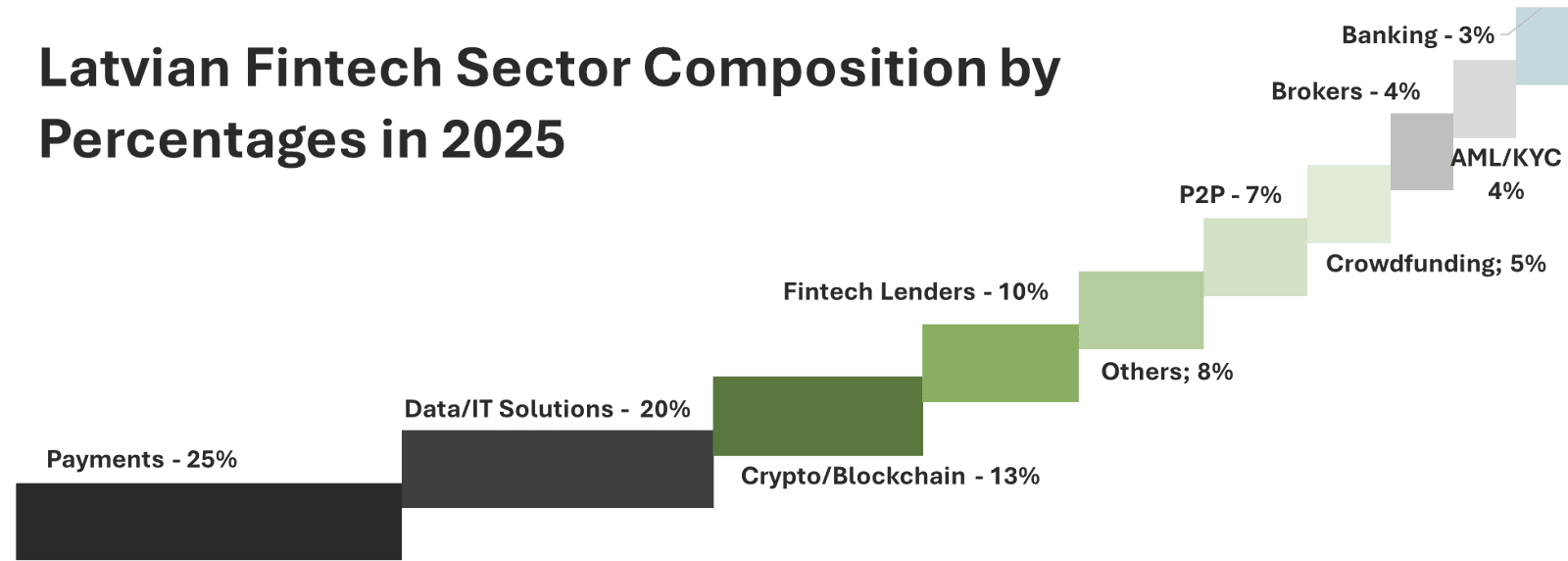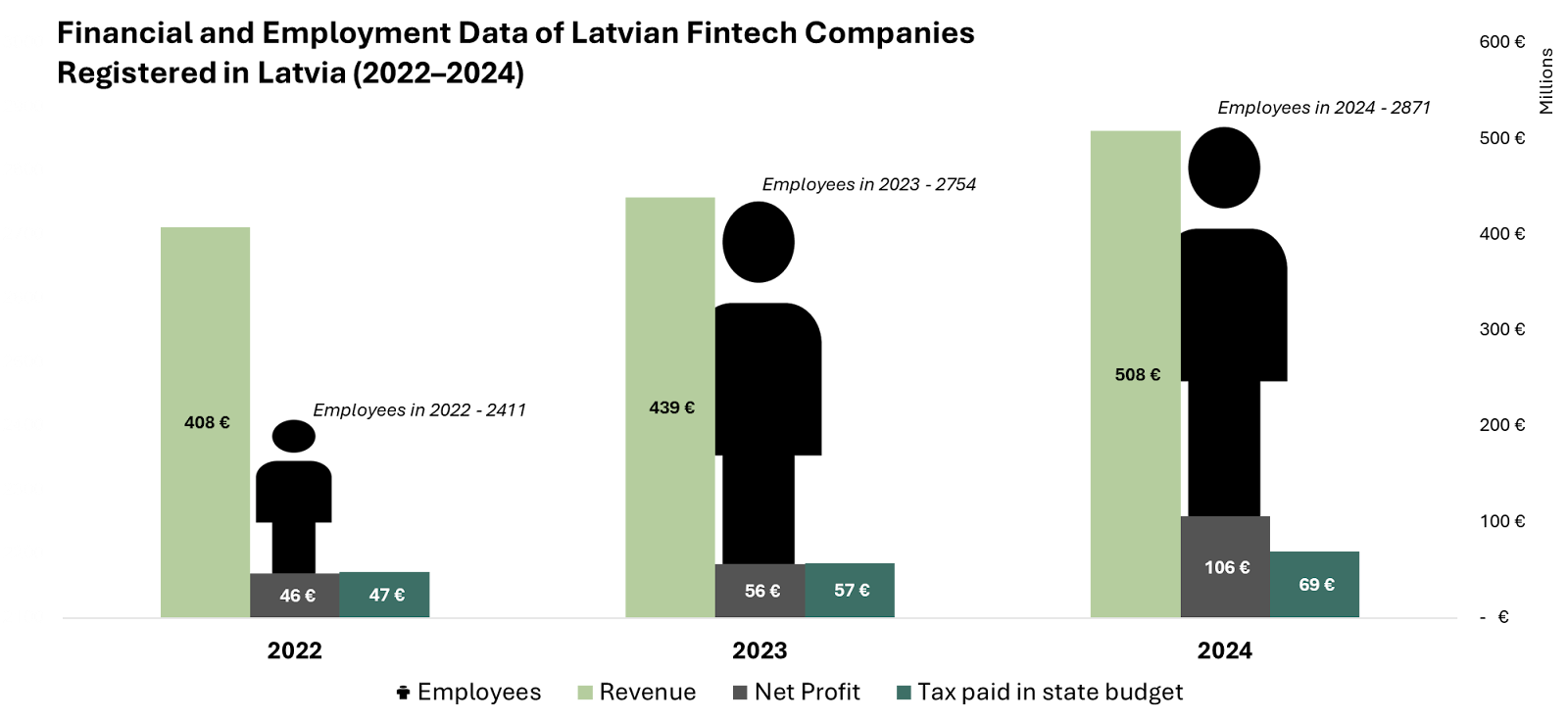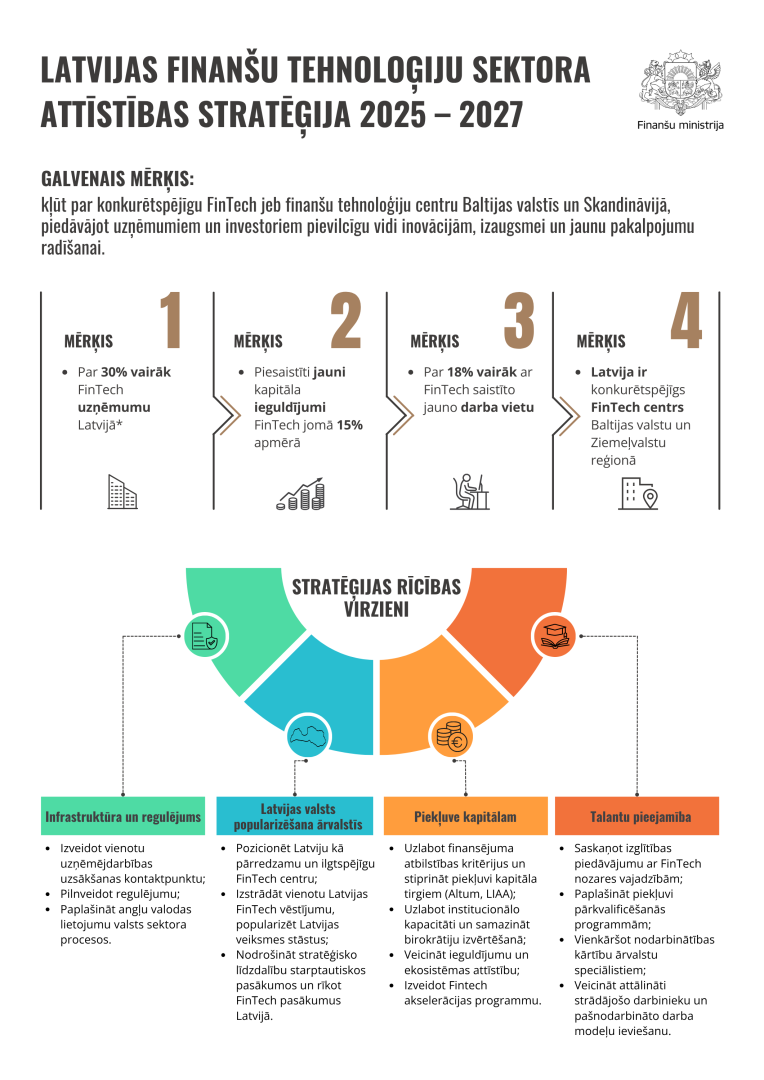Latvian Fintech Landscape Update 2025

Latvia’s fintech sector continues to strengthen its position on the global stage, with 2025 marking another year of strategic growth, investment, and international expansion. The latest wave of funding activity, M&A, and cross-border partnerships reflects not only the maturity and resilience of local players, but also the increasing international integration of Latvian-founded fintech companies.
For the fifth consecutive year, Venture Faculty, in collaboration with Dealroom, has conducted this annual update, capturing the key developments and trends shaping Latvia’s fintech landscape.
What began as a small, fast-evolving startup community has now matured into a structured and competitive industry with growing influence across Europe. Latvia’s fintech ecosystem is expanding in both depth and scale, setting the foundation for the country to position itself as a leading financial innovation hub in Northern Europe.
This year, Latvia’s Fintech Landscape welcomes 16 new companies across multiple sectors, adding further depth to an already diverse landscape, which now includes a total of 149 impactful fintechs. From a broader perspective, one consistent theme remains clear - payments and software continue to dominate the industry in terms of company count.
In the full 2025 picture, Payments (25%) and Data/IT Solutions (20%) together account for 45% of the entire market - meaning that nearly every second fintech company in Latvia finds its competitive edge in these two categories. Both segments represent the country’s strongest capabilities: fast, scalable payment infrastructure and sophisticated IT-driven financial services.

Just behind the leaders are Crypto/Blockchain (13%) and Fintech Lenders (10%) segments continuing to attract attention and investment. The crypto space in particular remains in the global spotlight as blockchain adoption accelerates, and Latvia’s share of this trend reflects both its technical expertise and openness to emerging technologies. Together, these four categories - payments, software, crypto, and lending - make up more than two thirds of the Latvian fintech ecosystem, illustrating that most companies operate at the intersection of technology, finance, and innovation.
Around these core areas, several smaller but strategically important niches help complete the picture. Others (8%), P2P (7%), and Crowdfunding (5%) highlight the continuing diversity of financing models, while compliance-related and intermediary fields such as AML/KYC (4%), Brokers (4%), and Banking (3%) reinforce the supporting regulatory and service infrastructure. Altogether, these segments round out a balanced and mature ecosystem - with transaction rails and IT solutions at the center, alternative finance in the middle tier, and compliance and regulatory services anchoring the edges.
From a macroeconomic perspective, the fintech segment continues to play a valuable role in Latvia’s economy, both through employment and through the taxes these companies contribute. To underline its growing impact, the available financial and employment data from 2022–2024 reveal just how quickly the industry is expanding. While the dataset only covers firms registered in Latvia with publicly available information - 104 companies that actively pay taxes in the country - the trends are clear and consistent.

Between 2022 and 2024, total revenue rose from €408 million to €508 million, a jump of nearly 25% in just two years. Over the same period, net profit more than doubled - from €46 million to €106 million - indicating not only higher business volumes but also improving operational efficiency and profitability across the sector. Meanwhile, tax contributions to the state budget grew steadily from €47 million to €69 million, reinforcing fintech’s expanding fiscal role in Latvia’s economy and demonstrating the industry’s increasing maturity and contribution to public finances.
The fintech workforce also expanded from 2,411 employees in 2022 to 2,871 in 2024, representing a 19% increase in just two years. This steady rise in employment - coupled with the surge in turnover and profits - suggests that Latvian fintech companies are scaling sustainably, generating high-value jobs, and further strengthening the country’s digital economy. In practical terms, revenue per employee reached around €177,000 in 2024, while profit per employee nearly doubled to €37,000, signaling that productivity and value creation per worker are on a clear upward trajectory.
However, as the industry itself often points out, these figures capture only a portion of the true picture. The data reflect only the activities of companies with legal entities registered in Latvia, leaving out a considerable part of the ecosystem. Many Latvian-founded fintechs operate within international corporate structures, conducting substantial parts of their business through entities registered in other jurisdictions. This means that a large share of total turnover, workforce, and tax contributions are recorded abroad, even when innovation, product development, or management functions remain rooted in Latvia.
It is also important to emphasize that the fintech landscape, while home to several well-established and profitable players, is still widely described as a rapidly expanding, innovation-driven sector. Much of the industry continues to exhibit startup characteristics - with significant portions of capital directed toward growth, research, and scaling activities rather than immediate returns. As a result, a notable share of investments and short-term losses are linked to future value creation, as companies prioritize product development, market expansion, and international reach.
Because of these dynamics, while the official numbers already appear strong, they remain a conservative reflection of the sector’s real economic footprint. When accounting for the global operations of Latvian fintech firms and the delayed returns from ongoing investments, it is reasonable to estimate that the true scale of Latvia’s fintech activity could be up to three times greater than what is visible in domestic financial statements. The current data, therefore, represent only the measurable foundation of a much larger and faster-evolving ecosystem - one that continues to push boundaries both at home and abroad.
Latvia’s fintech sector continues to gain international traction, with 2025 marking another year of strategic growth, investment, and recognition. A new wave of funding rounds, mergers and acquisitions, and partnerships highlights both the maturity of local players and the increasing global integration of Latvian-founded fintech companies.
Recognition has followed on the global stage. Jeff App ranked 27th on the Financial Times FT1000 list of Europe’s fastest-growing companies, reflecting the vitality of Latvia’s startup scene. Sun Finance, one of the region’s most successful alternative finance companies, was named the Baltic Fintech Company of the Year by the Baltic Fintech Days conference and featured among the world’s top fintech companies of 2025 by CNBC and Statista - a clear testament to Latvia’s growing prominence in global fintech rankings.
Several Latvian and Latvia-linked fintech companies secured new capital to support expansion, product development, and international growth. These deals underline continued investor confidence in both early- and mid-stage ventures, as well as the ability of larger players to attract funds through public markets.
Strategic M&A activity across the Baltic region remains strong, showcasing a trend toward consolidation, diversification, and international scale. Latvian fintechs are increasingly acting as acquirers, signaling their evolution from startups to mature market players.
Beyond funding and M&A, Latvian fintechs achieved several major milestones, demonstrating the sector’s global reach and growing ecosystem influence.
Latvia is entering a new phase in its fintech evolution with the launch of the Fintech Strategy 2025–2027, prepared by the Ministry of Finance in cooperation with Bank of Latvia and released for public consultation on 11 August 2025. The strategy’s core objective is to position Latvia as a competitive fintech hub in the Baltics and Nordics, driving sustainable growth and international recognition. The plan sets measurable goals - a 30% increase in locally registered fintech companies, a 15% uplift in new investment, and an 18% rise in sector employment by 2027 - underscoring the government’s commitment to turning fintech into a key pillar of the national economy.
The roadmap is structured around four strategic pillars designed to create the conditions for scalable innovation, stronger funding, and talent attraction.

Together, these measures mark an important shift from organic growth to coordinated, strategic development. With clear targets, institutional backing, and the support of one of the most open and innovation-oriented financial regulators in the EU - the Bank of Latvia - the strategy creates a strong competitive advantage for companies operating in the country. By combining regulatory accessibility with a clear policy direction, Latvia is laying the groundwork to transform from a fast-emerging fintech cluster into a well-defined, internationally recognized hub for financial innovation in Northern Europe.
Latvia’s fintech ecosystem has reached a defining moment - where growth, investment, and policy are converging into a clear, forward-looking trajectory. What began as a fast-moving startup scene has evolved into a structured, maturing industry with measurable scale, global reach, and strong institutional support - yet still firmly rooted in a vibrant base of emerging fintech startups.
The Fintech Latvia Association and The Latvian Blockchain Association continue to play a central role in shaping this progress. Together with the Bank of Latvia, the Ministry of Finance, and the Ministry of Economics, they are creating a climate where innovation can flourish and where international companies can confidently enter and scale. Latvia’s regulatory environment - open, transparent, and innovation-driven - is fast becoming one of its strongest competitive advantages in Europe.
This advantage is already visible. Under the MiCA regulation, more than 100 companies have expressed interest in establishing operations in Latvia, and over 20 have already filed applications - clear evidence that global fintechs see Latvia as a place to build, test, and expand. As awareness spreads, even more international firms are expected to relocate or anchor their EU operations here, accelerating knowledge exchange, capital inflows, and innovation capacity.
Looking ahead, access to capital will continue to deepen. Early-stage ventures are attracting growing interest from angel and venture investors, while established players leverage public markets to finance growth. These patterns are expected to converge, with successful strategies from major fintechs being replicated by emerging startups - strengthening Latvia’s capital markets and creating a self-reinforcing growth cycle.
The direction is clear: Latvia is transitioning from a promising fintech cluster to a magnet for global fintech expansion. With progressive regulation, active institutional cooperation, and a forward-thinking business environment, the country is well-positioned to attract a new wave of international fintechs seeking a dynamic, innovation-friendly home in the EU. The next few years will likely see more companies choosing Latvia as their base for European operations - turning today’s momentum into tomorrow’s leadership.
Author: Analyst, Tomass Vilks at Venture Faculty